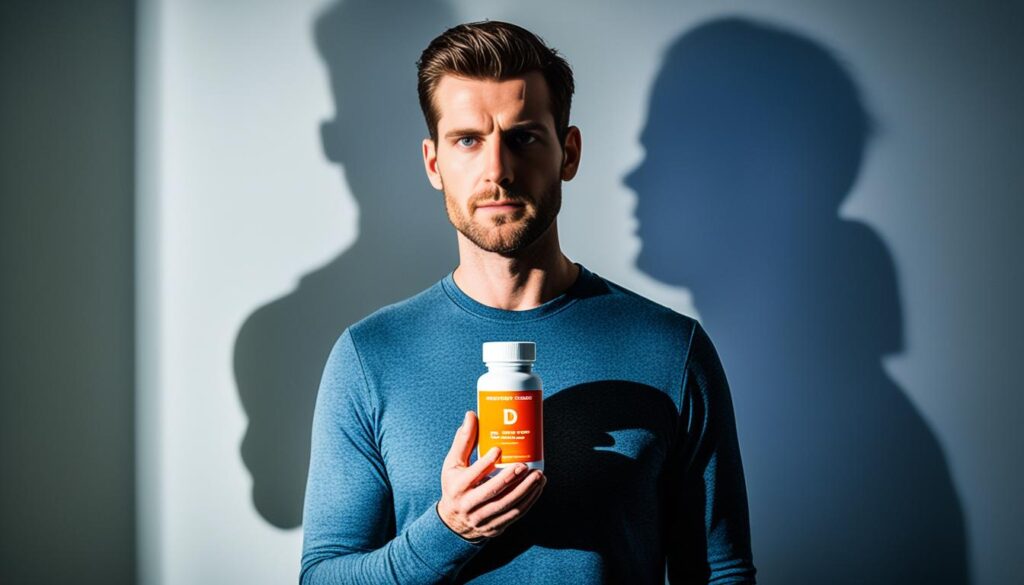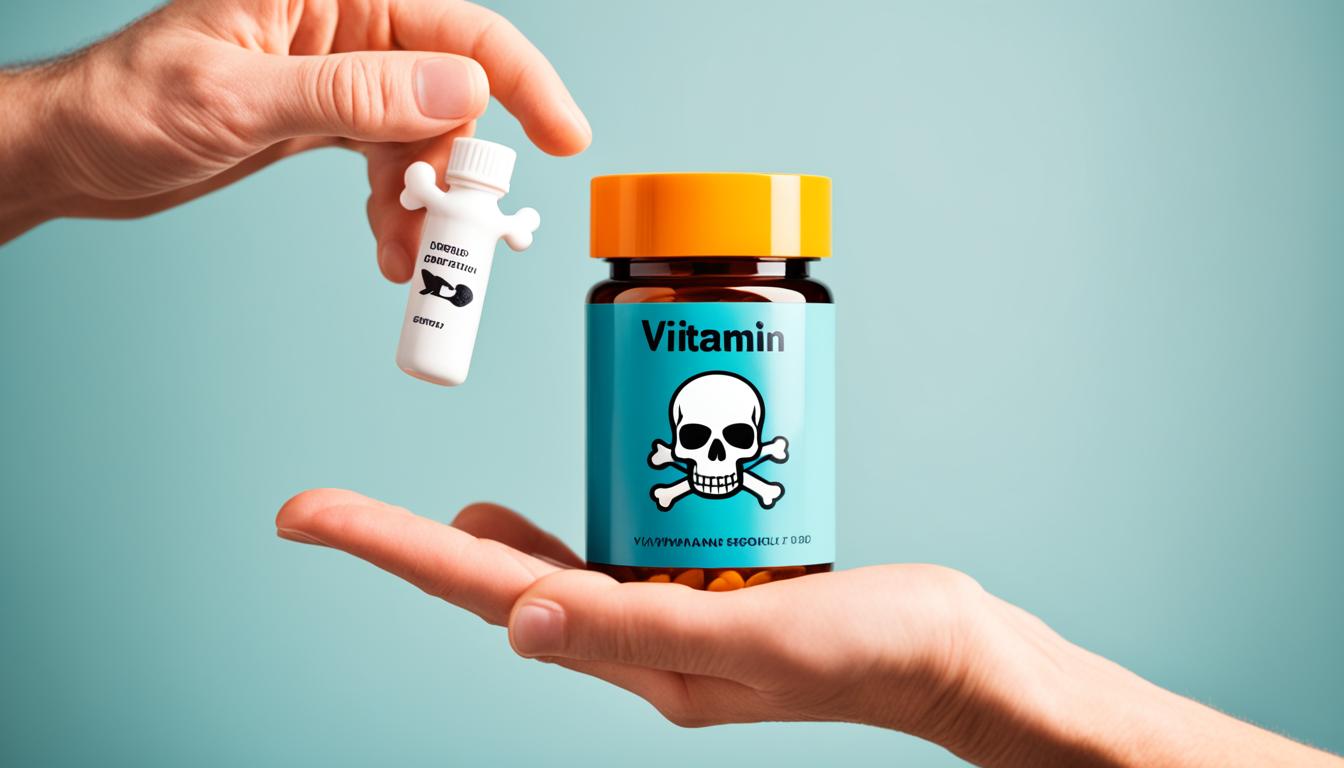Did you know that vitamin D, often hailed as a beneficial nutrient for bone health, has the potential to be deadly? It may come as a surprise, but excessive consumption of vitamin D can have severe consequences, including the risk of death. Understanding the facts can vitamin D overdose cause death and the potential dangers of vitamin D overdose is crucial to ensuring your well-being.
Key Takeaways
- Vitamin D overdose can have fatal effects and lead to death.
- Excessive levels of vitamin D can cause complications such as hypercalcemia and hypercalciuria.
- Toxicity can occur not only from supplements but also from excessive exposure to sunlight and certain medical conditions.
- Following recommended daily intake guidelines is essential to avoid vitamin D toxicity.
- Clear labelling regulations and consumer awareness are necessary to prevent vitamin D overdose.
The Tragic Case of Excessive Vitamin D Consumption
In recent years, the dangers of vitamin D overdose have come to light through a tragic case that has shocked the medical community. The case revolves around the unfortunate death of David Mitchener, an 89-year-old man who succumbed to the complications of vitamin D overdose.
The coroner’s investigation into Mitchener’s death raised significant concerns regarding the lack of explicit warnings about the risks and side effects of vitamin D supplementation. It highlighted the urgent need for better education and awareness surrounding the potential dangers of excessive vitamin D consumption.
An alarming discovery emerged during the autopsy: alarmingly elevated levels of vitamin D were found in Mitchener’s body. The concentration was well beyond the accepted safe range, suggesting a clear case of vitamin D toxicity. This finding shed light on the potentially fatal effects of vitamin D overdose and the tremendous risks it poses to one’s health.
It is crucial to understand the contributing factors to Mitchener’s tragic death and the importance of managing high concentrations of vitamin D. This case serves as a stark reminder of the potential complications that can arise from vitamin D overdose, emphasizing the need for caution when supplementing with this essential nutrient.
“This tragic case underscores the critical importance of raising awareness about the risks and potential complications of vitamin D overdose. We must ensure that individuals are well-informed and educated about the correct dosage and potential risks associated with excessive vitamin D consumption.”
| Case Details | Findings |
|---|---|
| Victim | David Mitchener |
| Age | 89 |
| Cause of Death | Complications of vitamin D overdose |
| Coroner’s Concerns | Lack of explicit warnings about the risks and side effects of vitamin D supplementation |
| Autopsy Findings | Alarmingly elevated levels of vitamin D in the body |
Understanding Vitamin D Toxicity and Its Symptoms
Vitamin D is an essential nutrient that plays a crucial role in maintaining bone health and supporting overall well-being. However, excessive intake of vitamin D can lead to toxicity, posing potential dangers to our health. It is important to understand the concept of vitamin D toxicity and be aware of its symptoms to prevent and address any potential issues.
Vitamin D toxicity, also known as hypervitaminosis D, occurs when there is an excess of vitamin D in the body. This can happen through the overconsumption of vitamin D supplements or the consumption of excessively fortified foods. However, it is important to note that vitamin D toxicity can also occur without the use of supplements, as our bodies naturally produce vitamin D when exposed to sunlight.
The symptoms of vitamin D toxicity can vary depending on the severity of the condition. One of the primary symptoms is hypercalcemia, which is an elevated level of calcium in the blood. This can lead to a range of symptoms, including nausea, vomiting, frequent urination, and constipation. Hypercalciuria, the presence of excessive calcium in urine, is also a common symptom of vitamin D toxicity.
In some cases, individuals may experience a condition known as vitamin D toxicity syndrome, which includes symptoms such as fatigue, weakness, muscle aches, and bone pain. It is important to be aware of these symptoms and seek medical attention if they occur, as vitamin D toxicity can have serious health consequences if left untreated.
Potential side effects of excessive vitamin D supplementation, particularly vitamin D3, may also include anxiety. It is crucial to consult with a healthcare professional before embarking on any vitamin D supplementation regimen to ensure safe and appropriate use.

| Symptoms of Vitamin D Toxicity | Significance |
|---|---|
| Hypercalcemia | Increase in blood calcium levels, leading to nausea, vomiting, frequent urination, and constipation |
| Hypercalciuria | Excessive calcium in urine, causing urinary problems |
| Vitamin D Toxicity Syndrome | Includes fatigue, weakness, muscle aches, and bone pain |
Guidelines on Recommended Daily Intake of Vitamin D
Following the recommended daily intake guidelines for vitamin D is crucial for maintaining optimal health. The appropriate amount of vitamin D3 to take daily varies depending on various factors, including age, sun exposure, and certain medical conditions.
Vitamin D is essential for the body as it helps in the absorption of calcium and phosphorus, strengthens bones, supports immune function, and regulates mood. However, excessive intake of vitamin D can lead to toxicity and potential health risks.
Here are the recommended daily intake guidelines for vitamin D:
- Infants (0-12 months): 400-1,000 IU
- Children (1-18 years): 600-1,000 IU
- Adults (19-70 years): 600-800 IU
- Adults (over 70 years): 800-1,000 IU
- Pregnant and breastfeeding women: 600-800 IU
Please note that these guidelines are general recommendations and may vary depending on individual needs and health conditions. It is important to consult with a healthcare professional to determine the appropriate daily intake of vitamin D for your specific circumstances.
Factors such as sun exposure, geographic location, skin pigmentation, and certain medical conditions like malabsorption disorders and kidney disease can influence the recommended vitamin D intake.
Remember, proper vitamin D supplementation is essential, but it is equally important to avoid exceeding the recommended daily intake. Be mindful of your vitamin D3 consumption to maintain a healthy balance and ensure overall well-being.

Can Vitamin D Overdose Cause Death?
Addressing the question of whether vitamin D overdose can lead to death
The potential fatal effects of vitamin D overdose
Understanding the risks and complications associated with vitamin D toxicity

Risks of Ignoring Vitamin D Overdose Warning Signs
Recognizing and addressing warning signs of vitamin D overdose is crucial to prevent potential complications. Ignoring these signs can lead to serious health risks and long-term consequences.
Excess vitamin D can be flushed out of the system through various methods:
- Reducing vitamin D intake: Lowering the dosage of vitamin D supplements under medical supervision can help decrease excess levels in the body.
- Increasing hydration: Drinking plenty of water can aid in the excretion of excess vitamin D.
- Adjusting sunlight exposure: Limiting sun exposure can help regulate vitamin D production and prevent further accumulation.

When symptoms of vitamin D overdose persist or worsen, seeking professional medical treatment is essential. Treatment options may include:
- Monitoring and observation: Regular check-ups and monitoring of blood levels to ensure vitamin D levels return to normal.
- Fluid therapy: Intravenous fluids may be administered to maintain proper electrolyte balance.
- Medication adjustments: Medications may be prescribed to manage complications arising from vitamin D toxicity, such as hypercalcemia.
Complications that can arise from untreated or ignored vitamin D overdose include:
- Hypercalcemia: Excess calcium in the blood can lead to kidney stones, bone pain, and organ damage.
- Renal dysfunction: Prolonged vitamin D toxicity can impair kidney function and result in chronic kidney disease.
- Cardiovascular issues: Elevated calcium levels can contribute to cardiovascular problems like high blood pressure and irregular heart rhythms.
- Gastrointestinal disturbances: Excessive vitamin D intake can cause nausea, vomiting, and digestive issues.
It is crucial to prioritize regular monitoring of vitamin D levels and promptly address any concerning symptoms to avoid complications associated with vitamin D overdose.
Labelling Regulations and Consumer Awareness
In order to safeguard public health, it is crucial to have clear labelling regulations for vitamin D supplements. These regulations should include comprehensive information on the potential risks and overdose dangers associated with vitamin D consumption. By providing consumers with accurate and transparent labelling, we can empower them to make informed decisions regarding their supplement intake.
Currently, there is a need for clearer warnings and information on packaging to address the risks of vitamin D overdose. This includes emphasizing the importance of following recommended daily intake guidelines and providing prominent alerts about potential side effects and complications. Improved labelling regulations can serve as an essential tool for preventing unintentional vitamin D overdose incidents.
However, labelling regulations alone are not enough. Consumer awareness also plays a crucial role in preventing vitamin D overdose. It is vital for individuals to understand the risks associated with excessive vitamin D consumption and to be aware of the symptoms of overdose.
By educating consumers about these risks and symptoms, we can empower them to make informed choices and seek appropriate medical advice when necessary.
The Role of FDA and Regulatory Bodies in Supplement Safety
When it comes to supplement safety, the role of regulatory bodies, such as the Food and Drug Administration (FDA), is crucial. The FDA plays a vital role in ensuring that dietary supplements are safe and properly labeled before they are available to the public.
Through its regulatory functions, the FDA aims to protect consumers from potential risks and health hazards associated with excessive supplement intake. The FDA establishes guidelines and regulations that supplement manufacturers must adhere to, including good manufacturing practices (GMP) and proper labeling requirements.
One of the FDA’s primary responsibilities is to review and evaluate the safety and efficacy of dietary supplements. This involves assessing the ingredients used, examining potential health claims, and determining appropriate dosage recommendations.
Furthermore, the FDA collaborates with other regulatory bodies and scientific experts to conduct research and gather data on supplement safety. This collective effort ensures that the FDA has access to the latest information and scientific findings to inform their regulatory decisions.
In recent years, concerns have arisen surrounding the excessive intake of certain supplements, including vitamin D. The FDA and other regulatory bodies have been actively addressing this issue by monitoring supplement labeling, conducting investigations, and implementing stricter regulations to prevent vitamin D overdose.
By working closely with regulatory bodies, healthcare professionals, and supplement manufacturers, the FDA plays a pivotal role in promoting safer supplement consumption. Their efforts contribute to establishing standards, enhancing labeling regulations, and ensuring that consumers are well-informed about the risks and benefits of dietary supplements.
However, while the FDA plays a significant role in supplement safety, it is important for individuals to exercise caution and take personal responsibility for their health.
Following recommended dosage guidelines, consulting healthcare professionals, and being aware of potential side effects are essential steps in maintaining safe supplement use.
Overall, the collaboration between regulatory bodies, such as the FDA, and various stakeholders is essential in safeguarding public health and ensuring the safety of dietary supplements.
Conclusion
In conclusion, it is crucial to enhance public health through education and regulation to prevent vitamin D overdose. By raising awareness about the potential risks and complications associated with excessive vitamin D consumption, we can empower individuals to make informed decisions about their health.
Preventive measures are key in avoiding vitamin D overdose. It is important to follow the recommended daily intake guidelines for vitamin D and consult with healthcare professionals when considering supplementation.
Additionally, individuals should be mindful of their sun exposure and consider factors such as age and underlying medical conditions that may affect their vitamin D needs.
Stricter labeling regulations and increased consumer awareness are essential in preventing vitamin D overdose. Clear and explicit warnings on vitamin D supplement packaging can help individuals make informed choices.
Likewise, educating consumers about the risks and consequences of excessive vitamin D consumption can empower them to take proactive steps towards their health.
FAQ
Can vitamin D overdose cause death?
Yes, vitamin D overdose can potentially lead to death. When consumed in extremely high doses, vitamin D can cause severe toxicity and lead to fatal consequences.
What happens if you overdose on vitamin D?
Overdosing on vitamin D can result in vitamin D toxicity, also known as hypervitaminosis D. This can lead to hypercalcemia, where there is an excess of calcium in the blood, as well as other symptoms and complications.
Can high doses of vitamin D be harmful?
Yes, high doses of vitamin D can be harmful and may cause vitamin D toxicity. It is important to follow the recommended daily intake guidelines for vitamin D to avoid potential risks and complications.
What level of vitamin D is toxic?
The toxic level of vitamin D can vary depending on factors such as age, health conditions, and individual susceptibility. However, a blood level of 25-hydroxyvitamin D (the form of vitamin D measured in the body) above 150 ng/mL is considered toxic.
What are the symptoms of vitamin D toxicity?
Symptoms of vitamin D toxicity can include nausea, vomiting, constipation, weakness, fatigue, weight loss, kidney problems, and increased thirst or urination. Severe cases can result in hypercalcemia, which may lead to bone loss, kidney stones, or even organ damage.
How excessive vitamin D levels can occur without the use of supplements?
Excessive vitamin D levels can occur due to a variety of reasons, including overexposure to sunlight, certain medical conditions that affect the body’s ability to regulate vitamin D, and excessive consumption of foods that are naturally high in vitamin D, such as fatty fish and fortified dairy products.
What are the potential side effects of vitamin D3?
Potential side effects of vitamin D3 can include nausea, vomiting, constipation, bone pain, and muscle weakness. In some cases, excessive intake of vitamin D3 may also cause anxiety or mood changes.
How much vitamin D3 should I take daily?
The recommended daily intake of vitamin D3 varies depending on factors such as age and medical conditions. Generally, adults aged 19-70 years should aim for 600-800 IU (15-20 mcg) per day, while adults over 70 years may need 800-1,000 IU (20-25 mcg) per day. It is always best to consult with a healthcare professional for personalized recommendations.
Can vitamin D overdose lead to death?
Yes, vitamin D overdose can potentially be life-threatening. Fatal effects can occur due to severe hypercalcemia and organ damage associated with vitamin D toxicity.
What are the risks and complications of vitamin D overdose?
Risks and complications of vitamin D overdose include kidney damage, calcium deposition in soft tissues such as the heart and lungs, bone loss, kidney stones, and electrolyte imbalances. These complications can be severe and may require medical intervention.
How to flush excess vitamin D out of the system?
If you suspect vitamin D overdose, it is important to seek medical attention. Your healthcare provider may recommend reducing vitamin D intake, increasing fluid intake, and in severe cases, administering medications to promote calcium excretion.
What are the treatment options for vitamin D overdose?
Treatment for vitamin D overdose may involve reducing or stopping vitamin D supplementation, increasing fluid intake to promote calcium excretion, administering medications to lower calcium levels, and monitoring kidney function. In severe cases, hospitalization and advanced medical interventions may be necessary.
What complications can arise from untreated or ignored vitamin D overdose?
Untreated or ignored vitamin D overdose can lead to severe hypercalcemia, kidney damage, and other complications affecting various organs. It is crucial to seek medical attention and address vitamin D overdose promptly to minimize potential harm.
What are the current labeling regulations for vitamin D supplements?
The labeling of vitamin D supplements is regulated by the U.S. Food and Drug Administration (FDA) to ensure accurate representation of ingredients, dosage, and potential risks. However, there may be a need for clearer warnings about the risks of vitamin D overdose on supplement packaging.
Do consumers have enough awareness about the risks of vitamin D overdose?
Consumer awareness regarding the risks and potential side effects of vitamin D overdose may vary. It is essential for individuals to educate themselves about safe vitamin D intake and consult healthcare professionals for personalized guidance.
What is the role of the FDA and other regulatory bodies in ensuring supplement safety?
The FDA plays a crucial role in regulating the safety and labeling of dietary supplements, including vitamin D. Regulatory bodies aim to monitor and ensure compliance with quality standards, promote accurate labeling, and protect consumers from potential harm associated with excessive supplement intake.
What preventive measures can be taken to avoid vitamin D overdose?
To avoid vitamin D overdose, it is important to follow recommended daily intake guidelines, consult healthcare professionals for personalized advice, read labels carefully, and be aware of sources of vitamin D in your diet and environment. Regular monitoring of vitamin D levels can also help prevent excessive intake.
How can public health be enhanced through education and regulation?
By promoting public awareness of vitamin D intake guidelines and potential risks of overdose, providing clear and accurate labeling on supplement packaging, and strengthening regulations, public health can be improved. Education and regulation can help individuals make informed decisions, prevent potential harm, and promote overall well-being.




